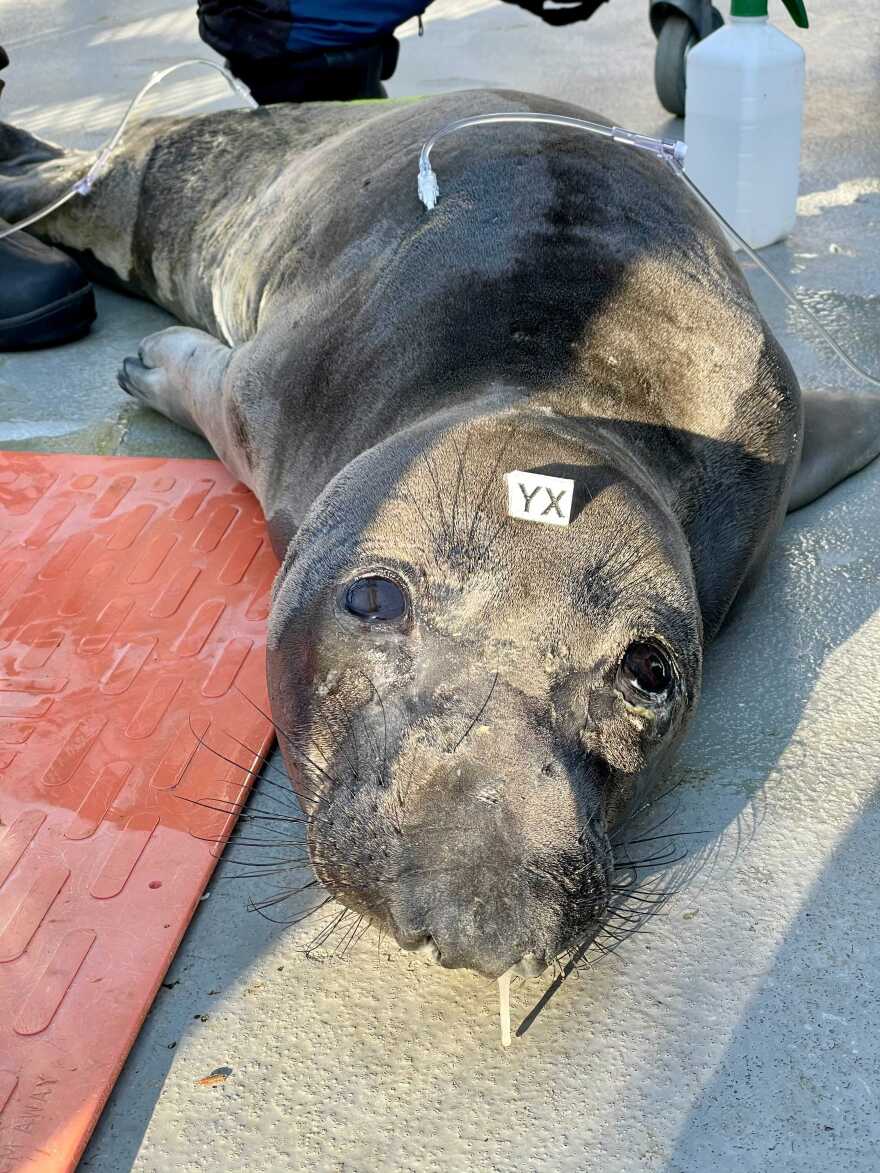Welcome to KAZU's weekly news roundup for 4/02/21. Here you'll find the top local stories of the week and a few select national stories from NPR.
Santa Cruz County made it into the Orange Tier of the state’s Blueprint for a Safer Economy on Tuesday. Effective this past Wednesday, bars can open outdoors and retail can function at full capacity. Dine-in restaurants can up their indoor capacity to 50 percent and gyms can go up to 25 percent indoors. In acknowledging the news, the county said while transmission rates locally look positive and vaccinations are continuing, coronavirus cases are increasing globally and the contagious U.K. variant has been found in the community. Santa Cruz County is urging the public to continue to wear masks and practice social distancing.
Santa Cruz County’s move into the Orange Tier is more great news for the Boardwalk which opened selected rides, including the iconic Giant Dipper roller coaster, Thursday. Except for a brief weekend last November, the rides have been closed for more than a year. It's the only time that has happened since the Boardwalk opening in 1907. Being in the Orange Tier does mean there are restrictions: only California residents can ride, all riders must wear masks including while on the rides and the Boardwalk is limited to 25 percent capacity. So, if you plan to visit the amusement park, check the website for reservations and instructions. KAZU’s Doug McKnight reported on opening day during Morning Edition and All Things Considered on Thursday.

Both Monterey and San Benito Counties didn’t see any movement in the tiers this week. But Monterey County is still hopeful that, under the current metrics, it can move into the Orange Tier at the earliest April 14. Alternatively, the state reaching the specific goal of vaccinating 4 million people in the most impacted zip codes (or HPI Quartile 1) would trigger a change in the Blueprint for a Safer Economy metrics, making it easier for Monterey county to move into the less restrictive tier. As of Wednesday, the state has vaccinated 3,629,008 people in the quartile.
After more than a year of closure the Monterey Bay Aquarium will reopen to the general public on May 15. Members can visit the 80,000 different sea creatures a little earlier as the aquarium will be doing two weeks of member days before opening to everyone. The aquarium can function at 25 percent capacity while Monterey County is in the Red Tier. If the county moves into the Orange Tier that increases to 50 percent.
ICYMI (in case you missed it) Monterey County has launched a $28 million rental and utility assistance program. The program is for those who have lost income because of the coronavirus pandemic. To qualify you also must earn no more than 80 percent of local median income. The money can go towards back payment of rent and utilities; and it can be used towards a few months of future rental payments. Apply online here or call 211.
Second Harvest Food Bank of Santa Cruz County is ending their drive through food distributions at the Santa Cruz Boardwalk at the end of April. Distributions will continue at the fairgrounds through September.
Yesterday, everyone in California, over the age of 50 became eligible for the coronavirus vaccine. Come April 15, everyone 16 and over will become eligible. The move comes as the state says vaccine supply is expected to significantly increase in the coming weeks. As of Wednesday, 20.7 percent of California residents have been fully vaccinated.
It’s important to remember though that once eligible the ability to book an appointment locally will depend on vaccine supply. Click here for available appointment slots in Monterey County and here for Santa Cruz County.
FEMA is offering financial assistance for COVID-19-related funeral expenses incurred after January 20, 2020. The funding comes from the Coronavirus Response and Relief Supplemental Appropriations Act of 2021 and the American Rescue Plan Act of 2021. You can find out who is eligible and how to apply here.
Local COVID-19 Case Data at time of publishing:
Santa Cruz County Cases - 15,363 total, 200 deaths (as of Wednesday)
Monterey County Cases - 42,979 total, 342 deaths
San Benito County Cases - 5,865 total, 61 deaths
10 months after the killing of George Floyd all eyes are on a Minnesota courtroom. Opening arguments commenced Monday, in the murder trial of former Minneapolis police officer Derek Chauvin. Chauvin, who is white, is charged with second-degree unintentional murder, third-degree murder and second-degree manslaughter in the death of Floyd, a Black man. The public is able to watch every twist and turn in the trial because it is being live streamed (find that here on MPR News’ Facebook page). NPR is following the trial closely with live updates.
A Poetry Challenge. As lawmakers grapple with ways to address surges in anti-Asian attacks nationally and througout California, Kwame Alexander, NPR’s resident poet, and Morning Edition's Rachel Martin ask listeners: How do you cope with recent anti-Asian violence and discrimination? Tell NPR in a list poem. Submissions are due by noon ET on Monday, April 5.
DNA found in a discarded COVID-19 mask has helped identify an unknown violent rapist. That’s according to Monterey County District Attorney’s Jeannine Pacioni who said the suspect was convicted on Tuesday by a jury. The crime committed in King City dated back to February 2018. Police were able to get the DNA from the suspect by essentially tricking him into discarding his mask into a waste bin that was actually lined with an evidence bag. You can read the entire press release here.
This past Wednesday, the nation marked Cesar Chavez Day. Locally, many reflected on what the civil rights activist meant to them -- including Monterey County’s agricultural Commissioner Henry Gonzales. To mark the holiday, Gonzales collaborated with Hartnell College in a look back at a rally that took place at the Salinas college in 1970. Gonzales was still in high school at the time and had already spent three summers harvesting lettuce with his grandfather. The historic chant “Si se puede,” or “Yes we can,” was inspiring to Gonzales who then went on to attend Hartnell College, earning an Associate of Science degree in Agricultural Mechanics, and has been Monterey County’s ag commissioner since 2018. For more on Chavez’s life and legacy check out this 2016 article by NPR.
For more than a decade students at UC Santa Cruz have been counting seeds and measuring trees on a plot near the campus. That data has been used in a new study that says climate change is causing declines in seed production for older and larger trees in western forests. KAZU’s Michelle Loxton visited the plot with the university scientists to find out what that means for our future forests.
The monarch butterfly now has its own bill in Congress. The butterfly, which traditionally winters in the Monterey Bay area, has seen a sharp decline in population. According to local Congressmember Jimmy Panetta, who is one of the bill’s sponsors, the monarch population has declined 99 percent since the 1980s. That drop is seen as a threat to agriculture because butterflies are a major pollinator for crops. The bipartisan bill, H.R. 5920, authorizes $12.5 million to conserve and restore the monarch’s habitat.

If you visited Asilomar State Beach last Sunday, you might have spotted The Marine Mammal Center rescuing a weaned northern elephant seal pup. The female pup, named Yubby, was transported to the center’s hospital in Sausalito where she was diagnosed with maternal separation, malnutrition, dehydration and a swollen left front flipper. This is a particularly vulnerable time for elephant seal pups, says the center’s medical director Dr. Cara Field, because they are beginning to learn how to hunt for food on their own. Treatment for the approximately 2-month-old pup includes receiving bagged fluids and being tube fed a special fish smoothie. Yubby is one of more than 70 elephant seal pups currently in rehabilitation at the center’s hospital. Here are some tips if you see a marine mammal in distress:
- Keep a safe distance and keep your pets on a leash,
- Use your zoom. You’re not supposed to be so close you can take a selfie,
- Call the center’s hotline on 415-289-SEAL (7325).
The astounding flyways and amazing lives of migratory birds. That was the topic of Monday’s edition of Fresh Air. Host Dave Davies spoke with Scott Weidensaul about his new book called A World On The Wing: The Global Odyssey Of Migratory Birds. The birder has spent decades studying bird migration and his tremendous love for feathered creatures really comes across in this episode. Hear about the raptors that launched a 12-year-old Weidensaul’s fascination with birds and how he likes to joke that he gets text messages from snowy owls.
The global shipping community heaved a sigh of relief Monday, when a massive cargo ship was finally dislodged from the Suez Canal. As NPR Reporter Camila Domonoske wrote in this cleverly titled piece, ‘Ship Happens: Coffee, Livestock, Ikea Furniture Among The Objects Stuck At The Suez’, the Ever Given had been blockading more than 10 percent of global shipping traffic for almost a week. The array of goods on the hundreds of ships waiting on either side of Ever Given included livestock, lumber, oil, automobiles, exercise equipment and instant coffee.
Finally, everyone at KAZU would like to thank the community for the outpouring sympathy expressed for KAZU News Director Erika Mahoney following the loss of her father in the Boulder, Colorado mass shooting on March 22. Your kind thoughts and gestures are deeply appreciated during this difficult time.
Until next week,
The KAZU Team



